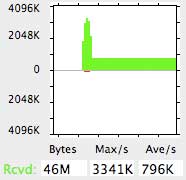 Much as my best days are those on which I “learn a lot,” I find that some of my best days are also “totally scattered and almost devoid of billable hours.” In the last three days I’ve probably addressed ten problems for ten different people, and although I’ve billed out a good number of hours to a couple of clients, the majority of the others aren’t getting a bill at all. How do you feel when you’re in this kind of situation—is this extreme attention deficit disorder, or is there something useful to be learned from this kind of behavior? [Read more…]
Much as my best days are those on which I “learn a lot,” I find that some of my best days are also “totally scattered and almost devoid of billable hours.” In the last three days I’ve probably addressed ten problems for ten different people, and although I’ve billed out a good number of hours to a couple of clients, the majority of the others aren’t getting a bill at all. How do you feel when you’re in this kind of situation—is this extreme attention deficit disorder, or is there something useful to be learned from this kind of behavior? [Read more…]
Hello, Are you still blogging?
 I cleaned out my news reader subscriptions this morning[1. I use NetNewsWire on my Mac PowerBook and Reeder on my iPad, with the data being coordinated through Google Reader online] and found that of about 30 blogs I dropped, most of them hadn’t been updated in over a year, or even since 2006 in a couple of cases. Are people getting tired of blogging? (For that matter, are people getting tired of tweeting? I hardly ever do it any more…) To lay a motivational foundation, I was cleaning out my subscriptions because I now read them on an iPad and it has been taking me nearly a couple of hours a day to read them, so I needed to cut a lot of duplicates—seeing the same information several places, in blogs that are just “repeaters.”
I cleaned out my news reader subscriptions this morning[1. I use NetNewsWire on my Mac PowerBook and Reeder on my iPad, with the data being coordinated through Google Reader online] and found that of about 30 blogs I dropped, most of them hadn’t been updated in over a year, or even since 2006 in a couple of cases. Are people getting tired of blogging? (For that matter, are people getting tired of tweeting? I hardly ever do it any more…) To lay a motivational foundation, I was cleaning out my subscriptions because I now read them on an iPad and it has been taking me nearly a couple of hours a day to read them, so I needed to cut a lot of duplicates—seeing the same information several places, in blogs that are just “repeaters.”
Ten reasons my buddies might have quit blogging (remember, I call blog posts “articles”):
- Too much time goes into writing a single article
- email inbox is over 1,000 and need to catch up
- too busy reading other blogs
- watching video more than ever – still haven’t seen all the TED videos
- iPad doesn’t provide an easy way to write for the blog (get a keyboard!)
- 400 podcasts stacked up and no longer commute to work so I can’t get through the backlog
- don’t have anything original to say and got tired of repeating what others were saying
- started tweeting and then I didn’t even have enough time for tweeting
- quit blogging for {pick one} summer/trip/vacation/religiousholiday and just never got the energy to start again
- got a real job. (Whatever that is…)
Hmmm…the balance to be struck is between consuming and producing, I think. And consuming is far easier than producing.
Visualizing data helps us find opportunities
 I had run into GapMinder some time ago, but was reminded of it when I encountered this talk that Ola Rosling[1] gave at Gov 2.0 Summit[2] that really makes it clear how the visualization of data — especially visualizing data over time — can give us valuable insights into trends in the physical and social world(s). Their Trendalyzer software is used by Google…as you’ll see in this presentation. [Read more…]
I had run into GapMinder some time ago, but was reminded of it when I encountered this talk that Ola Rosling[1] gave at Gov 2.0 Summit[2] that really makes it clear how the visualization of data — especially visualizing data over time — can give us valuable insights into trends in the physical and social world(s). Their Trendalyzer software is used by Google…as you’ll see in this presentation. [Read more…]
Reaching Advocates and Influencers
 Rather than blasting out advertising indiscriminately to everyone, firms are finding they can target individuals who like their brand and can influence others to see the brand more positively. There are more and more ways to find out who your brand’s advocates and influencers are. That’s because software is now tying the data together so we can actively decide how to reach and, more importantly interact with, our passionate customers. Social media allow us to openly and transparently interact with and have conversations with our customers.
Rather than blasting out advertising indiscriminately to everyone, firms are finding they can target individuals who like their brand and can influence others to see the brand more positively. There are more and more ways to find out who your brand’s advocates and influencers are. That’s because software is now tying the data together so we can actively decide how to reach and, more importantly interact with, our passionate customers. Social media allow us to openly and transparently interact with and have conversations with our customers.
Susan Bratton, JD Lasica, Renee Blodgett and Robert Scoble discuss these aspects of marketing and customer relations in this roundtable in Cambridge as a part of Traveling Geeks 2009.
Reaching Theoretical Broadband Link Speeds (in the US)
 I’ve just spent 48 hours “beating myself up” over the Comcast (cable) high-speed Internet system here in San Francisco. I say beating myself up because I was so convinced the problem was Comcast that I spent hours on the phone with them, but ultimately most of the problems were in my own network. [Not all, but most.]
I’ve just spent 48 hours “beating myself up” over the Comcast (cable) high-speed Internet system here in San Francisco. I say beating myself up because I was so convinced the problem was Comcast that I spent hours on the phone with them, but ultimately most of the problems were in my own network. [Not all, but most.]
In US cities, the license to install and operate cable television networks is a city-granted monopoly. When cable TV was first being installed, each city opened a bidding process, and cable operators bid to be granted the franchise to install and operate the cable system in that particular city. If they won it, they then had exclusive rights. So in San Francisco, we have telephones provided by AT&T (which originally was Pacific Bell Telephone Company) and we have cable TV provided by ComCast (only – no other provider). Satellite TV lies outside this structure and is available everywhere on a competitive basis, but that’s a different issue.
Comcast also delivers Internet connectivity (and telephone service) via their cables. And that’s the rub. [Read more…]